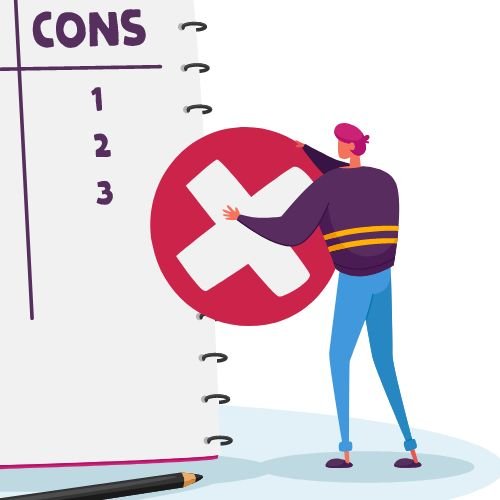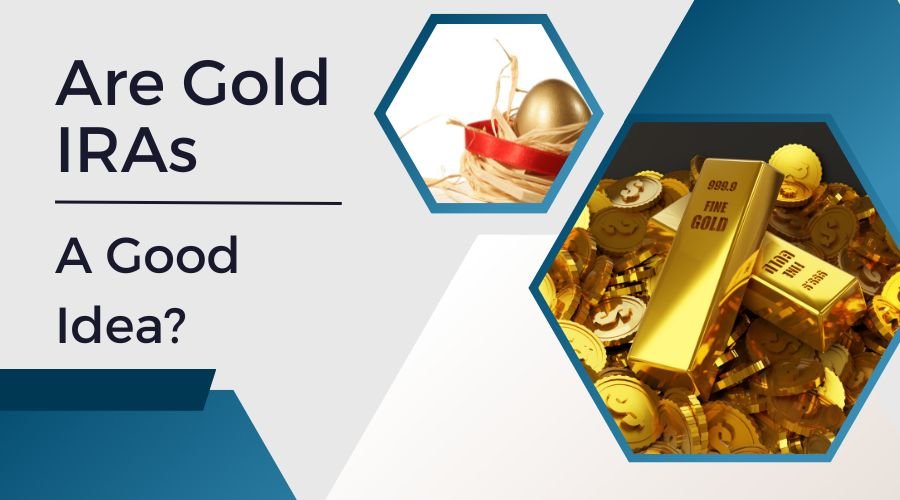Disclaimer: Precious Metals Advice is made possible by our readers. Throughout our posts there are affiliate links to certain companies that we may earn commissions from. The opinions are strictly my own and are not influenced by brands or companies. Please read our Advertising Disclosure for more information.
Before we get to the article about are gold IRAs good idea, finding the perfect Gold IRA and Gold Investment company can be a time-consuming task.
That’s why we have researched and ranked the top companies based on critical metrics for your convenience.
<< Click Here To Read The Best Gold & Silver IRA Companies Reviewed in 2024 >>
And if you’re in a rush and you need the facts as soon as possible, here is our top 3 choices along with a detailed review of each.
#1 BEST OVERALL: Goldco
#2 BEST FOR HIGH NET WORTH INDIVIDUALS: Augusta Precious Metals
➡️ August Precious Metals Detailed Review
#3 BEST FOR INVESTMENTS UNDER $5000: Birch Gold Group
Are Gold IRAs a good idea? It depends on several factors including your retirement goals and how the current market is performing. With gold, you have an asset that has traditionally been seen as a safe haven and has been used as a way to hedge against inflation for centuries.
If you’re looking to diversify your retirement investments while also protecting your savings from market swings, adding gold to your portfolio could be the right decision.
It’s important to take into account the advantages and disadvantages of investing in physical gold before committing.
On the other hand, gold can be difficult to store and its value is affected by market fluctuations. You also have to factor in processing fees which are associated with buying, storing, and continually monitoring gold investments over time.
All these aspects should be evaluated when deciding if a gold IRA is a right choice for you.
#1 Readers Choice
Goldco is the leader in the Precious Metals Industry. From Precious Metals IRAs to direct purchases, Goldco has maintained a near perfect track record and therefore is our #1 recommendation for all our readers.

Understanding Gold IRAs

Individual retirement accounts, or IRAs, are a popular retirement savings option for individuals that offer tax advantages in comparison to other saving vehicles.
The two main types of IRAs are traditional IRA and Roth IRA; traditional IRAs allow investors to contribute pre-tax income, while Roth IRAs allow for contributing post-tax income.
Gold IRAs are sometimes referred to as precious metals IRAs and offer investors the opportunity to invest in physical gold or other precious metals as an additional source of diversification within their retirement portfolio.
Unlike traditional gold IRA investments which tend to be comprised of stocks, mutual funds, and other assets, gold IRA investments require investors to purchase and safely store physical gold with the assistance of a custodian such as a bank or a brokerage firm.
It is important for investors to compare the benefits of each type of IRA before deciding which option is best suited for their particular financial needs.
How Does a Gold IRA Work?
A Gold IRA, or self-directed individual retirement account, is an investment vehicle that enables investors to own and hold physical gold.
It works much like a traditional IRA in certain ways, but rather than containing stocks, bonds, and mutual funds, this type of account holds gold in the form of coins or bullion.
After selecting a custodian or broker who offers Gold IRAs, the investor must open an account and fund it with cash or rollover funds from another IRA or 401(k). Then the broker will purchase the requested gold on behalf of the investor and arrange for its storage in a secure depository.
The value of the Gold IRA may go up or down as time goes on while also enabling investors to take physical possession at any time, subject to IRS rules and potential taxes.
Finding a Broker or Custodian

Setting up an account and finding a broker or custodian is an important step. A broker or custodian carries the responsibility for purchasing and storing the physical gold that will be held in the IRA.
When selecting a broker or custodian, it’s essential to choose someone with a quality reputation in the industry.
Doing research is key; reviews, complaints on regulatory bodies, and advice from trusted financial advisors are all great ways to get informed.
Additionally, fees and level of service should also be considered when making your selection – you want a reliable provider who can be your partner through this process. Choosing a reputable broker or custodian is vital to setting up your Gold IRA securely and successfully.
How to Do a 401(k) to Gold IRA Rollover
#1 Readers Choice
Goldco is the leader in the Precious Metals Industry. From Precious Metals IRAs to direct purchases, Goldco has maintained a near perfect track record and therefore is our #1 recommendation for all our readers.

A 401(k) to Gold IRA rollover requires transferring funds from an existing 401(k) retirement plan to a self-directed Precious Metals IRA (Individual Retirement Account). The process can be complex, so it’s important to understand the steps involved in order to ensure a successful rollover.
The first step is choosing a reliable Gold IRA custodian or broker. They will offer help with paperwork and walk people through the rollover process, which typically includes setting up a brand new Gold IRA and sending money over from your existing 401(k).
Afterward, you’ll need to request a direct rollover from your current 401(k) plan administrator. This means that funds are transferred directly from the 401(k) account into the custodian’s bank account or analogous financial institution, without you having possession of the transferable assets.
The Benefits of Physical Assets or Precious Metals

Physical gold is an attractive asset with many benefits that makes it an appealing choice for investors. Gold has long been regarded as a safe-haven asset, as its value remains relatively constant despite changes in the economic environment.
One of the key benefits of physical gold is its store of value, which means it has maintained its purchasing power over thousands of years.
This makes go ideal hedge against inflation since central banks can increase the money supply at will but the supply of gold remains largely fixed.
Additionally, investing in physical gold or other precious metals can help diversify a portfolio by reducing overall risk.
An increasingly popular way to invest in physical gold is through a Gold IRA, which allows individuals to access a wide range of benefits from investing in gold without having to physically possess it, such as reduced transaction costs and income tax advantages.
How does a Gold IRA work? A custodian must be chosen to hold the funds for investment and manage the transactions for you.
The funds are then used to purchase approved precious metals such as gold or silver coins and bars from only IRS-approved dealers. Metals are typically stored in allocated/segregated storage with major banks or financial institutions’ vaults worldwide and can usually be liquidated with ease whenever necessary.
The Benefits of Gold as an Asset in Demand

Gold has long been recognized as an asset in high demand around the world. It is a crucial part of many investment portfolios due to its numerous benefits that are hard to find anywhere else.
One of the biggest advantages of gold is its liquidity; it is relatively easy to buy and sell, allowing investors to easily convert their holdings into cash when needed.
In addition, it has universal acceptance since it is accepted in virtually every country and culture as a form of payment for goods and services. Finally, gold’s supply is limited mainly because it can’t be replicated like other forms of money, making it an even more sought-after asset.
Overall, gold remains an attractive option for anyone looking for an asset with desirable characteristics, providing an ideal store of value and medium of exchange for investors for years to come.
Buy Approved Gold IRAs

When it comes to investing in a Gold IRA, it is essential to ensure that the gold meets certain criteria in order to be considered “approved.” Approved gold for IRAs may include bullion gold coins and bars that adhere to specific weight, purity, and production standards set by the IRS.
This includes popular coins such as the American Eagle, Canadian Maple Leaf, South African Krugerrand, and Austrian Philharmonic which must all have a face value that is directly proportional to their weight, as well as being at least 99.5% pure.
When it comes to gold bars, they too must be 99.5% pure and issued by a refiner or assayer approved by either COMEX or NYMEX or another exchange recognized by the IRS.
While there may be other rules associated with purchasing approved gold for your Gold IRA beyond these minimum requirements, they all need to be taken into account prior to investing in any form of gold-backed securities.
Benefits of an IRA Account

For those looking to save for retirement, an Individual Retirement Account (IRA) should be a consideration. An IRA account offers several benefits including tax savings, diversification of investments, and self-directed options to help maximize investment returns.
The first key benefit of an IRA account is tax advantages. Contributions to a traditional IRA are typically tax-deductible, which lowers taxable income in the year it’s contributed.
In addition, any earnings inside the account are not subject to annual taxation until funds are withdrawn for retirement. This allows your money to grow without being subject to taxation each year.
Another important benefit of an IRA account is the diversification of investments. By investing in a wide range of assets such as stocks, bonds, mutual funds, and alternative investments like real estate and precious metals, you can reduce your risk and optimize your return more effectively than if all holdings were concentrated in one type of asset class.
Finally, you may also opt for a self-directed IRA account which allows even more flexibility when choosing investments – from real estate and private equity investments to cryptocurrency – giving you the opportunity to build a more complex portfolio that has greater potential for higher returns.
With so many advantages available with an IRA account, it’s no wonder why they are so popular among those planning or already in retirement.
Gold IRA Tax Rules

Gold IRA tax rules are important to understand before investing in a self directed gold ira account. Contributions to this type of account are made with pre-tax dollars and these contributions are tax-deductible.
As such, when money is withdrawn from the gold IRA in retirement, it will be taxed as ordinary income at the current tax rate.
Additionally, gold held in a gold IRA must meet certain IRS regulations if they are to maintain its taxation status. This means that the gold must satisfy fineness and purity standards stipulated by the IRS and any failure to adhere to these requirements can lead to both penalties and taxes applied to the investment.
Therefore, it pays to do your due diligence on the rules regarding gold IRAs prior to investing as non-compliance can come with significant financial penalties.
Types of Gold IRAs
Gold IRAs come in a variety of options, making it easy for investors to find something that works for them. Common types of Gold IRAs are the traditional, Roth, and SEP gold IRAs.
Traditional accounts allow contributions with pre-tax money, meaning taxes will be due upon withdrawal at retirement.
It’s also possible to fund an account with after-tax money through a Roth gold IRA option; you will pay taxes when it comes time to begin taking distributions at retirement.
Additionally, SEP gold IRAs offer the same advantages as a traditional SEP IRA and allow employees of small businesses or self-employed individuals to contribute funds that are only taxed on withdrawals during retirement instead of contributions.?
Overall, gold IRAs can help investors diversify their portfolios as they prepare for retirement. As potential buyers explore investment opportunities, they should take into consideration which type of gold IRA option is right for them in order to understand their tax implications years down the line when it’s time for retirement withdrawals.?
Gold IRA Rollover
#1 Readers Choice
Goldco is the leader in the Precious Metals Industry. From Precious Metals IRAs to direct purchases, Goldco has maintained a near perfect track record and therefore is our #1 recommendation for all our readers.

A Gold IRA rollover is an ideal way for investors to diversify their retirement portfolios without having to pay capital gains taxes on the transfer of funds.
Typically, funds from an existing retirement account such as a 401(k) or traditional IRA can be rolled over quickly and easily into a Gold IRA. This allows investors to convert their existing retirement funds into physical gold or other precious metals that are held in a tax-advantaged account.
To begin the process, investors should find a reputable Gold IRA custodian who is responsible for overseeing the rollover process, managing the transfer of money from the existing retirement portfolio, and ensuring that any gold purchased is safely stored on behalf of the investor.
The custodian will work with the individual to establish the Gold IRA accounts and facilitate all aspects of transferring funds from their existing 401(k) plan into an appropriate gold IRA vehicle.
Once this is completed, investors can begin purchasing gold or other precious metals with the transferred funds. This investment vehicle can provide them with long-term financial security that’s independent of stock market fluctuations and economic cycles.
Rolling over part of your retirement into a Gold IRA rollover may be beneficial for those seeking diversified portfolio growth in uncertain times.
Are ETFs Good for Gold IRAs
Gold Exchange Traded Funds (ETFs) offer investors a great way to gain exposure to the gold market without physically holding gold.
Unlike purchasing and storing physical gold, ETFs are easy to buy and sell, making them a popular option for those looking to invest in gold. For this reason, many investors consider adding gold ETFs to their Gold IRA.
However, it is important to note that not all ETFs are allowed in an IRA; only certain ones that meet the IRS guidelines are eligible for inclusion.
The main benefit of using Gold ETFs when investing for retirement is the ease of trading. By allowing access to price fluctuations in the short term, investors can take advantage of market volatility and rapidly change their holdings accordingly.
Also, there is a relatively low overhead associated with trading an ETF compared to buying and selling physical gold. Ultimately, incorporating Gold ETFs in a retirement plan can be a smart move but should be done after consulting with your custodian or financial advisor.
Pros of Gold IRAs

1. Same tax benefits as a regular IRA: Contributions may be tax-deductible and earnings are tax-deferred until they get withdrawn from the traditional gold IRA account.
2. Buy-and-hold retirement strategy: People saving for retirement who believe in the long-term future of gold prices could use a gold IRA to buy and hold physical gold as a portion of their retirement portfolio in a tax-advantaged way.
3. Self-directed IRAs give you more control: A gold IRA is a type of self-directed IRA. Just as you can hold gold in a self-directed IRA, you can also hold additional atypical IRA investment options such as real estate and other non-stock-related investments.
Cons of Gold IRAs

1. Custodian fees: Custodians willing to manage your self-directed gold IRA must take precautions to do so and likely charge fees to provide these services.
2. Required minimum distribution complications: Once you reach age 72, the IRS requires you to take RMDs from traditional IRAs to capture the tax revenue from the money in the account. If you have no other traditional IRAs, you’d have to sell gold to take the distribution and pay taxes on it.
3. No earnings other than appreciation: Physical gold doesn’t pay dividends or capital gains distributions like mutual funds or individual stocks may provide.
4. Costs to buy and sell gold: The mechanics of how to buy gold are cumbersome. Each time you buy or sell gold, you won’t likely get the market price. Instead, brokers charge a fee above the market price to sell you gold.
They also take a cut when you use their services to sell gold you already own. These extra costs add yet another cost above other non-physical gold investing options.
Requirements for Withdrawing From a Gold IRA
Withdrawing from a gold IRA requires that certain conditions must be met. While the most important of these is that the account holder must be at least 59 ½ years old to avoid any early withdrawal penalty fees, other requirements such as the ‘five-year rule’ for both traditional or Roth IRAs must also be taken into account.
It is important to note that the amount withdrawn will be subject to income tax if the withdrawal occurs from a traditional gold IRA.
All of these conditions must be met in order for an account holder to make successful and penalty-free withdrawals from their gold IRA account.
Furthermore, investors should speak with their financial advisor or tax accountant before making any decisions so they can better understand all issues related to taxable events and mandatory withdrawals from their retirement plans.
Gold’s Special Risks

Investing in gold can be an attractive option for many investors looking for a sense of security in their portfolios. However, it is important to be aware of the potential risks associated with investing in gold.
One such risk is volatility, as the price of gold is known to fluctuate significantly over short periods of time, leading to potential losses for investors who aren’t careful.
Despite its reputation as a safe haven asset, gold isn’t immune from market crashes or other economic events that could impact profitability.
Investors must also exercise caution when purchasing physical gold, as fraud and scams have been known to occur within the industry. Fake gold coins and bars are sometimes sold by unscrupulous dealers, making it difficult to detect counterfeits without expert authentication.
Additionally, due to the high price point related to investing in gold bars or coins, buyers should be certain they are working with reputable dealers when making any purchases.
Overall, investing in gold has both its benefits and its risks. While it can provide a sense of security and diversification in a portfolio when done properly, understanding the potential hazards of such an investment can help guide wiser purchase decisions related to this asset class.
FAQS About Are Gold IRAs a Good Idea
IRA-approved gold refers to specific types of gold that meet the Internal Revenue Service’s (IRS) requirements for inclusion in an individual retirement account (IRA).
The IRS has approved certain types of gold coins and bars produced by reputable mints, which can be held within a gold IRA.
To buy gold in an IRA, you must first establish a self-directed IRA account with a custodian who specializes in precious metals.
Then, you can fund the account and work with the custodian to purchase IRS-approved gold coins or bars from a dealer. The custodian will arrange for the storage of the physical gold in an approved depository.
To hold physical gold in an IRA, you need to set up a self-directed IRA with a custodian that allows for precious metal investments. The custodian will purchase the gold on your behalf and store it in a secure depository.
You cannot take physical possession of the gold until you reach retirement age or decide to withdraw from the IRA.
Once you reach age 72, the IRS requires you to take required minimum distributions (RMDs) from your traditional IRA accounts, including a gold IRA, to capture the tax revenue from the money in the account.
The custodian of your gold IRA account will calculate the amount of your RMD and distribute it to you, typically in cash or by liquidating some of the assets in the account.
If you fail to take your RMD or take less than the required amount, you may have to pay a penalty tax of 50% of the amount not withdrawn. Roth IRAs, on the other hand, do not have RMD requirements.
Whether a gold IRA is a good investment or not depends on individual investment goals and risk tolerance. Gold can be a valuable diversification tool in a retirement portfolio, and a gold IRA offers tax advantages similar to traditional IRAs.
However, gold prices can be volatile and don’t provide any income or dividend payments.
Additionally, there are costs associated with storing and maintaining physical gold. It’s important to carefully consider these factors before making a decision to invest in a gold IRA, and to consult with a financial advisor to determine if it aligns with your investment objectives and overall financial plan.
It depends on your 401(k) plan. Not all plans allow for investing in physical gold. However, some plans do offer this option through a self-directed brokerage account.
It’s important to check with your plan administrator to see if this option is available and what the specific rules and restrictions are for investing in gold within your 401(k) plan.
It depends on your individual financial situation and investment goals.
Rolling over your 401(k) into a gold IRA may be beneficial if you want to diversify your portfolio and protect against inflation and market volatility.
However, it is important to consider the costs and potential risks involved, such as custodian fees and the possibility of lower returns compared to traditional investments.
It is recommended to consult with a financial advisor before making any investment decisions.
A precious metals IRA can be a sound investment for those wanting to diversify their portfolio and protect their wealth against potential market turmoil.
Gold and other precious commodities have traditionally been a wise choice during times of economic uncertainty and inflation due to their intrinsic value.
Before investing, it is important to consider the costs associated with purchasing and storing physical bullion and any restrictions that may pertain to a self-directed IRA.
As with any investment decision, it is advisable to research thoroughly and seek professional financial advice beforehand.












